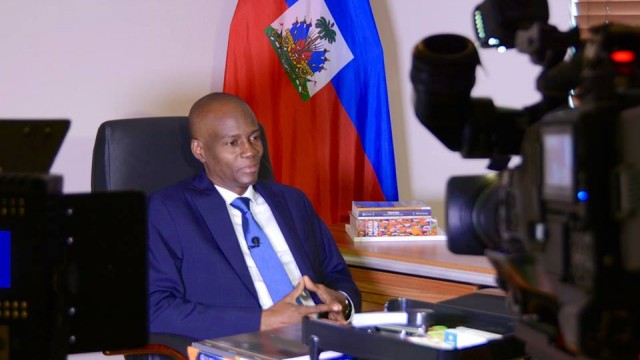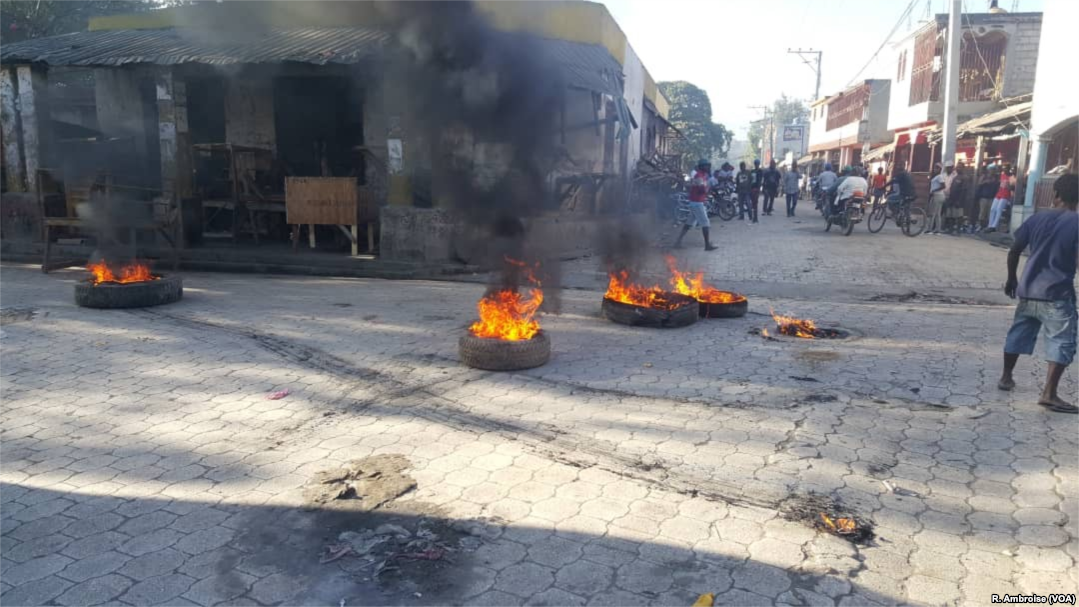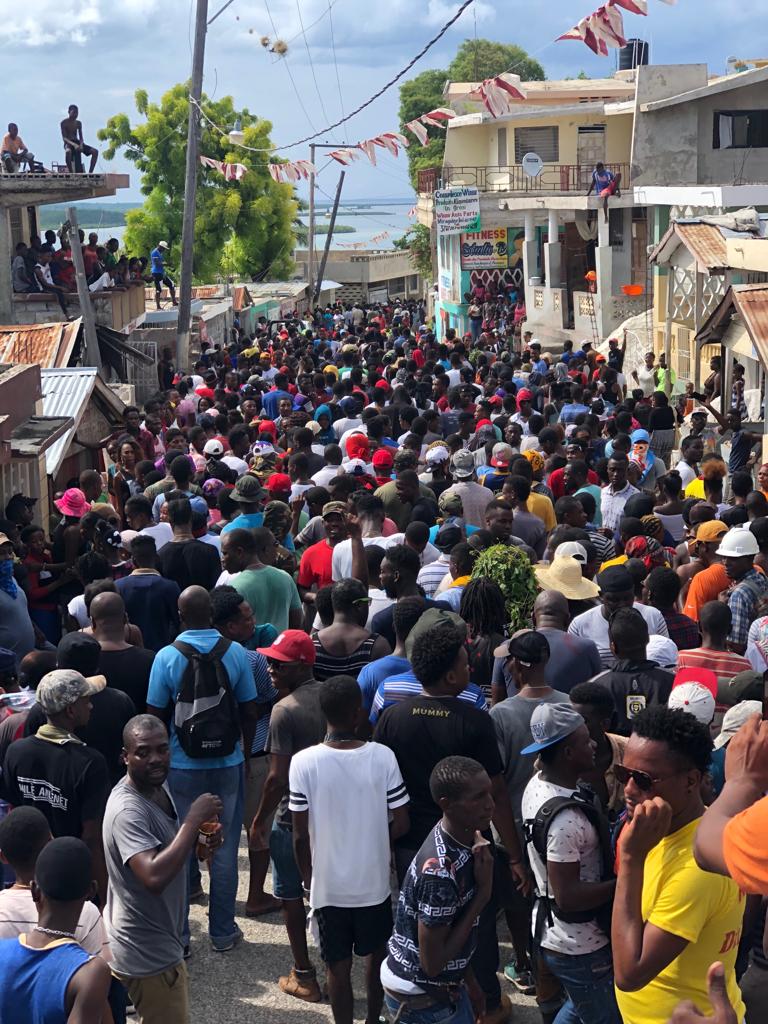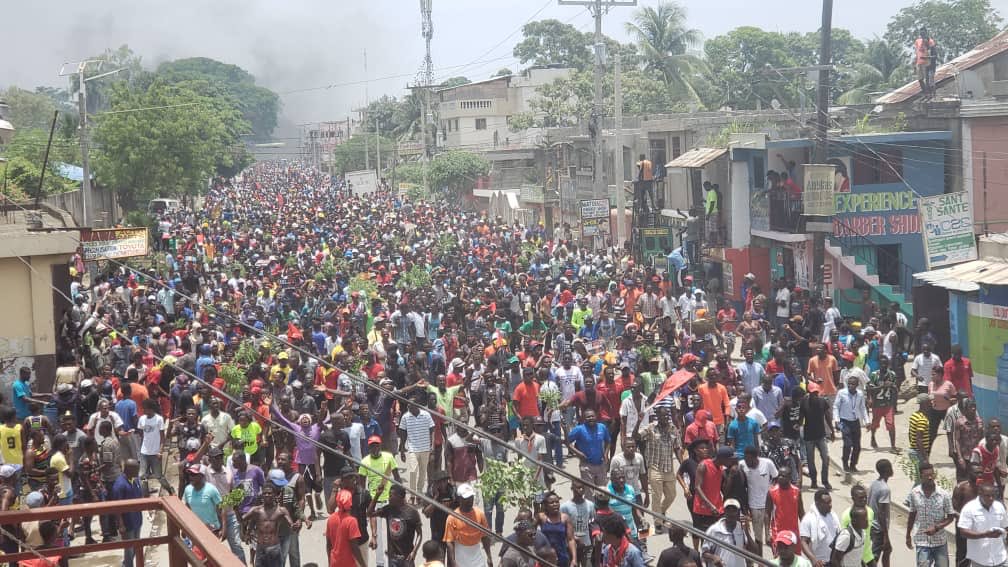The mass movement to oust Haitian President Jovenel Moïse has intensified in recent weeks. Facing severe fuel and food shortages, and a totally inept and corrupt government, the masses have taken to the streets once again to force the president to resign and fight for a way out of the deepening economic and social crisis. Mass strikes and demonstrations have shut down the country for several weeks, with the movement intensifying this past weekend into a nationwide uprising against the Moïse government.
Corruption scandal
 The uprising in Haiti is a continuation of the mass movement that erupted last summer against the Moïse government’s proposed end to the fuel subsidy and the PetroCaribe corruption scandal / Image: Jovans Lorquet
The uprising in Haiti is a continuation of the mass movement that erupted last summer against the Moïse government’s proposed end to the fuel subsidy and the PetroCaribe corruption scandal / Image: Jovans Lorquet
The unfolding uprising in Haiti is a direct continuation of the mass movement of strikes and demonstrations that erupted last summer against the Moïse government’s proposed end to the fuel subsidy and the developing PetroCaribe corruption scandal. The movement exploded again earlier this year in the face of increasingly severe fuel and food shortages, and as the details of the extent of the theft of PetroCaribe funds by the country’s political elites became known.
At the end of May, the Haitian Superior Court of Auditors submitted a 600-page audit of the PetroCaribe programme to the senate. This audit followed a previous report exposing the corruption and had been long awaited. It detailed the massive corruption and theft of funds, and showed that Moïse himself had pocketed millions of dollars as part of an embezzlement scheme to steal funds from the Haitian people amounting to billions of dollars intended for social and infrastructural spending through the PetroCaribe programme.
In fact, it now looks like three different companies controlled by Moïse are involved in the corruption scandal. The audit proved what everyone knew already: the Haitian ruling class and political elites stole some $2 billion dollars by double-billing the Public Works Ministry, which also dispensed funds to the corrupt elites and their companies before projects were completed, and in some cases before they were even started.
Protesters seeking to overthrow US/Trump-backed regime of @moisejovenel pile up tires to burn down police station in Canape Verte in #Haiti's capital moments ago. Police have yet to react. pic.twitter.com/wbrlOm6InN
— Haiti Information Project ? (@HaitiInfoProj) September 27, 2019
After the earthquake in 2010, construction was started on hundreds of roads, schools, and hospitals, etc., but in many cases these projects were never finished. One article explained that “In southern Port-au-Prince, a gigantic half-built hospital and a bridge to nowhere serve as daily reminders of government embezzlement.”
The mass movement, which has ebbed and flowed over the past year and a half, erupted again in June with the release of the audit and with the increasingly resolute opposition calling for the resignation of President Moïse.
Fuel and food shortages
Having lost access to subsidised Venezuelan oil in early 2018, the Haitian government was forced to turn primarily to US oil companies and pay market prices for its fuel supply. The government could not afford this and has fallen into debt with these energy companies, who refuse to deliver fuel until these debts, amounting to some $100-130m, are cleared.
 The masses took to the streets since September in an ongoing series of demonstrations and strikes, which have completely shut down Port-au-Prince and paralysed the rest of the country / Image: public domain
The masses took to the streets since September in an ongoing series of demonstrations and strikes, which have completely shut down Port-au-Prince and paralysed the rest of the country / Image: public domain
The fuel shortage in the country, which was already at crisis levels, continued to worsen over this past summer. Shops and schools have been closed as a result of the shortage and hospitals are barely functioning. There are long queues at fuel stations, with very little fuel available. Blackouts are frequent and long-lasting, and with increasing prices many have no access to fuel whatsoever.
With unemployment now at over 70 percent and inflation at around 20 percent, many cannot afford what little fuel and food is available. To make matters worse, a severe drought has now left many without access to water. The situation has become more acute as the Dominican Republic has closed its border with Haiti, cutting off an essential route for supplies.
Faced with increasingly severe shortages of basic goods, the masses took to the streets throughout September in an ongoing series of demonstrations and strikes, which have completely shut down Port-au-Prince and paralysed the rest of the country.
The demonstrations and strikes swelled to insurrectionary proportions over the past week, as Moïse allies in the senate attempted to install the president’s choice for prime minister, a position that has formally been left empty for months after a series of resignations. The senate session descended into chaos, with a senator allied with Moïse drawing a weapon and firing at demonstrators as he left the Senate building, injuring an AP journalist and security guard.
Forced underdevelopment in #Haiti is maintained by the longstanding practice of foreign manipulation of elections to install depraved puppet regimes. This is why a senator can banish his gun at protesters and another can shoot two people, including a journalist, with impunity. pic.twitter.com/nNHkSkYTor
— Madame Boukman - Justice 4 Haiti ?? (@madanboukman) September 26, 2019
Balance of class forces
Haiti has effectively been in a pre-revolutionary or revolutionary situation for several years, certainly at least since last summer when mass protests and strikes broke out over the fuel and corruption crisis.
Naturally, especially in the absence of a determined, revolutionary, and working-class leadership, there have been several ebbs and flows in the movement of the masses. At key moments, it appeared as if the Moïse government would fall, but each time the government avoided collapse or being overthrown as the movement abated.
In many respects, the situation in Haiti is a microcosm for the world situation. Globally, the working class is very strong and increasingly determined to fightback against the attacks of the ruling class. This explains the worldwide intensification of the class struggle and polarisation of society. However, the movement is held back at every turn by its leadership. This has prevented the working class in many countries from moving directly towards revolutionary action to change society.
The ruling class, on the other hand is very weak. Everywhere one looks, the old establishment parties and leading elements of the ruling class are becoming increasingly isolated – and detested by the working masses and youth. This has created a situation where, because of the general strength of the working class and youth and the overall weakness of the ruling class, the capitalists in many areas cannot move directly towards counterrevolutionary action (coups, dictatorship, etc.) This has created something of an impasse, although an impasse where all the momentum rests with the workers and youth.
The situation in Haiti, with mass, insurrectionary strikes and demonstrations, is far more advanced than many other countries. This is no accident – the chain of global capitalism is indeed breaking at its weakest links. However, we can also see that the balance of class forces is similar to that around the world, and there is somewhat of an impasse in that the masses have been unable to overthrow the government and change society. The masses have tried time and time again to take their destiny into their own hands, overthrow their rotten government, and take control of their lives, but each time the government has survived.
As we explained earlier this year:
“With no access to funds or fuel, the Haitian government has no real means of buying any temporary social peace. They have no economic means at their disposal to appease the masses, nor do they have any political capital to appease the political demands of the movement. With the national police force reportedly wavering, the government will find it very difficult to repress the movement with physical force. This doesn’t mean that the police cannot and will not attack demonstrations and striking workers, but given the balance of forces it seems unlikely that the government could defeat the movement with police action alone.”
Of course, there are elements in the ruling class, and among certain layers of the petty bourgeoisie, that would very much be interested in moving towards some sort of coup to resolve the situation. The Guardian recently reported that Nicolas Duvalier (the son of Jean-Claude “Baby Doc” Duvalier and grandson of François “Papa Doc” Duvalier) has been canvassing in Miami for support among the Haitian community there. When asked if there was any support in Haiti for the family of the former dictators, one interviewee in Haiti said “Oh yes. Among small business people. I met one. He wants to make nails, but the Bigio family, who has the monopoly on steel here, pushed him out. That is the type of person who would support Nicolas, and there are many more like him.”
Jeremie, #Haiti protests to end the US/Trump-backed misery in #Haiti. pic.twitter.com/9CeLFLorLL
— Haiti Information Project ? (@HaitiInfoProj) October 1, 2019
However, given the weakness of the Haitian state and police, a successful coup seems unlikely – though it may be attempted at a certain point if the crisis continues without some sort of resolution.
Of course, one major factor in Haitian politics is the imperialists – particularly the United States, Canada and France – who in the past have not been afraid to directly intervene politically and militarily in Haitian politics to preserve their interests, investments, and profits. For the past 15 years, they have attempted to exert their dominance and control via the UN occupation force. However, it should be noted that the “UN peacekeeping mission” is slated to close on 15 October, to be replaced by a “political mission”.
A direct intervention by US imperialism (or Canadian, French, etc.) seems unlikely, given the political situation in the imperialist countries. However, it cannot be ruled out that some sort of deal will be brokered by the imperialists and the Haitian ruling class to keep UN troops in Haiti to force an end to the mass movement and “resolve” the crisis, i.e. some of coup supported or led by UN troops.
Beware the Popular Front
The opposition seems more determined than ever to overthrow the Moïse government. Mass strikes and demonstrations erupted this past Friday. Barricades were erected and police stations and courts were attacked and burned. The masses have entered into a direct confrontation with the state to impose their will on the situation and force the government to resign.
The people of Cité Soleil, one of the largest and poorest areas of the capital and indeed the world, and centre of revolutionary activity in Haiti, has risen up and expelled the hated security forces there. Indeed, the police have been overwhelmed by the movement of the masses and are being disarmed and/or forced to retreat in areas. One demonstrator explained that, “We are telling the people who live in the Cité Soleil area and the Haitian population to rise up to overthrow this government because President Jovenel Moise is not doing anything for us, just killing us.”
One opposition leader has said:
“On Sept 27, 2019, the people fired Jovenel Moise as their president… Jovenel Moise is a president in hiding.... he is no longer leading the country.”
Moïse has not been since last Wednesday (25 September) when gave an address at 2:00 a.m. (which nobody could watch because they were either in bed or lacked access to electricity due to the fuel shortages), calling for “calm”. Although his supporters claim he is still in control and “reflecting like a good coach”, it is widely believed he is in fact in hiding.
The opposition is actively looking for him to force him to resign and bring him to justice. As the opposition characterised Friday’s demonstrations as “the final battle in the war to get rid of Jovenel”, one of the leaders stated that:
“[If] Jovenel doesn’t resign today, whatever happens to him is not our responsibility. Jovenel Moise will be held accountable for everything that happens in the country today.”
Given the scale of the movement to oust him and the determination of the masses, it seems unlikely that Moïse will be in power for much longer. However, it is clear that, while the movement is united in its goal to oust Moïse, there are many dangers ahead.
The Guardian reported that the organisation Batay Ouvriye is circulating pamphlets providing a Marxist analysis of the situation and is calling for the revolutionary movement to arm itself for self-defence. This is undoubtedly a good thing and a necessary step for the movement to take.
However, Andre Michel, a spokesperson for the Democratic and Popular Sector has said a few things that represent a direct danger to the movement. A few days ago, he tweeted that: “The Democratic Sector will accompany the population in its mobilization until we uproot Jovenel Moïse. The population needs to remain mobilized right up until we install a president and provisional government in the country.” He later also said in an interview that, “Jovenel Moise is no longer president; the people have fired him, but the people must remain mobilized. The roadblocks must go higher and the mobilization has to go higher until we install a provisional government.”
 Only a government of the workers, farmers and poor of Haiti will be able to resolve the current crisis. Only socialism offers a way forward for the people of Haiti / Image: Haiti Information Project
Only a government of the workers, farmers and poor of Haiti will be able to resolve the current crisis. Only socialism offers a way forward for the people of Haiti / Image: Haiti Information Project
Mr. Michel is correct when he says that the masses must remain mobilised to get rid of Moïse. However, the class divide in the opposition is clearly revealed in what he has said. When he says that the masses must remain mobilised “right up until we install a president and provisional government”, he is reflecting the interests of the bourgeois and petty-bourgeois layers of the opposition, who want to use the mass mobilisations and strikes to deal a blow against their opponents in the government and put themselves in power. Once they are in power, they will naturally want the masses to go home and stop the mobilisations.
From the perspective of the masses, overthrowing the rotten Moïse government would only represent the real start of the Haitian Revolution, not its end. The Haitian ruling class has proven time and time again that it is completely incapable of leading the country or solving the problems of poverty and unemployment the masses face.
Mass movements and strikes cannot be turned off and on like a tap. Though the bourgeois elements in the opposition will try, the Haitian masses will not be used like pawns on a chessboard. The overthrow of Moïse will be a tremendous step forward and victory for the movement, but in and of itself it will not solve anything for the people of Haiti. It will not solve the problems of corruption, crushing poverty, unemployment and inflation, the fuel and food shortages, and the general economic crisis.
Should Moïse be overthrown, a new bourgeois government, ruling on the basis of capitalism and in the interests of the imperialists, will be completely powerless to do anything about the situation. The corruption will continue. The needs of the people will go unmet, the economic crisis will continue to deepen, and the masses could find themselves in the exact same situation they are in now (or an even worse situation).
The Haitian masses cannot trust the bourgeois elements in the opposition to solve the crisis and can only rely on their own forces. If the Moïse government should fall – something that looks increasingly likely with each passing day – the masses cannot settle for waiting for a new provisional government based on capitalism and cooperation with the imperialists. The Haitian people cannot wait for another bourgeois government to fail.
The mass movement of workers, youth and poor in Haiti must take power into their own hands. This will be the only way to address the economic problems the country faces, the corruption and poverty, and the only way to address the fuel and food shortages. Strike committees should be set up and connected across the country to coordinate strike actions and the activities the government is incapable of doing.
Sources of fuel, food and water must be expropriated and distributed according to need by the strike committees. These committees must begin organising the collection and distribution of basic goods such as food, water and fuel, and organise transportation, education, sanitation and healthcare. No bourgeois government, provisional or otherwise, will be able to do this.
This puts the socialist transformation of society on the order of the day in Haiti. The situation facing the Haitian masses is truly one of socialism or barbarism. Only a government of the workers, farmers and poor of Haiti will be able to resolve the current crisis. Only socialism offers a way forward for the people of Haiti.

